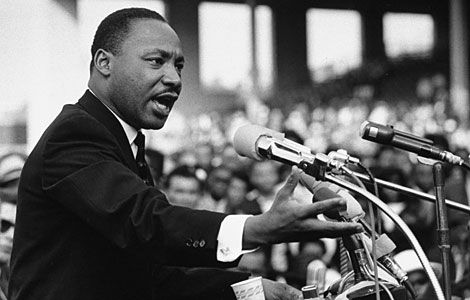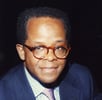
Fifty years ago today, Martin Luther King, Jr. delivered what would be his final speech. He was assassinated the next day at the Lorraine Motel in Memphis, Tennessee. His leadership in the Civil Rights Movement captured the attention of a nation, including journalist, Lee A. Daniels. He recalls his childhood in Boston during the Civil Rights Movement and how Dr. King's message transcended from the southern states, inspiring him to be a part of the movement in his own way.
Growing up in Boston during the late 1950s and 60s, I was far from the front lines of the Civil Rights Movement in the south. I was not part of the sit-in at the Woolworth’s lunch counter in Greensboro, North Carolina in 1960. I wasn’t in Montgomery, Alabama to be beaten on the Freedom Rides in 1961 or jailed in Jackson, Mississippi. I was not in danger of being attacked by police dogs or blasted by firemen’s high-pressure hoses during the marches in Birmingham, Alabama in 1963.
In fact, I lived a comfortable, happy existence in Boston’s surprisingly small, close-knit black community. But from the moment my brother and I, at our parent’s and grandmother’s subtle, insistent urging, began to read about America’s racial crisis, I considered myself a civil rights activist.
I mean activist, not “follower.” The latter word was too soft, too ambiguous, too lacking in passion for what I envisioned my role to be: I wanted to do things to enable black Americans to gain the “unalienable rights” that actually were theirs by birth. I wanted to challenge racism head-on.
This was an easy concept for black adolescents in the north in those years to formulate. It was painfully obvious that, despite the laws mandating equality of opportunity, segregation and racial discrimination was rampant in the region’s public schools, residential housing patterns, and job opportunities. That certainly described life in Boston, a city whose extraordinary history and high-gloss educational, medical, and cultural institutions significantly obscured its provincialism and sedate but deep-rooted commitment to racial segregation and stratification.
And yet, the Boston of those years also contained a vibrant, integrated civil rights community. Its energy and optimism sprang from both black Boston’s long history of fighting for equality — the local struggle to integrate the Boston schools would lead a decade later to the momentous 1974 federal court school desegregation order — and its direct connection, via individual friendships and church and community-group alliances, to the Movement in the south.
The most dramatic example of that connection was Martin Luther King, Jr. himself. Many black Bostonians knew Dr. King and his wife, Coretta, from their years as graduate students in the city: he at Boston University School of Theology; she at the New England Conservatory of Music. That included Reverend Michael E. Haynes, then pastor of Roxbury’s historic Twelfth Baptist Church, who would become one of my most important mentors. The two men had been co-junior pastors at the church in the early 1950s before Dr. King was called to lead the Dexter Avenue Baptist Church in Montgomery and just before Rosa Parks’ defiance of Jim Crow laws led to the Montgomery Bus Boycott. They would remain close friends all the remaining years of Dr. King’s life.
Dr. King’s years in Boston and his friendships with ordinary black Bostonians that I myself knew, symbolized how fluid and intimate the bond was between the Movement’s “leaders” and the masses. That truth was powerfully on display at that very moment as local activists — some of them the parents of my own friends — were intensifying their demands that school officials stop segregating the city’s elementary and middle schools. My brother and I joined a church-based “freedom choir.” We eagerly participated in the one-day student public school boycotts in 1962 and 1963 so we could instead attend “Freedom Schools” in local churches to learn more about the Movement in the South — and in Boston.
Those experiences helped me understand that the Movement grew and was sustained from the ground up, not the top down. In turn, that enabled me to realize Dr. King was best thought of not as its “leader” but as its “convener,” as the primary spokesman for and custodian of its ethos, its soul force; and that the wonderful sense of obligation the Movement fostered was a product of their own commitment to the cause.
In one sense, of course, that cause was very specific: gaining equal citizenship rights for black Americans. But in an even larger sense, the Civil Rights Movement stands as an extraordinary expression of civic responsibility. It underscored for the whole world that whoever you are, wherever you are, you can always be an upstander; you can always work in small, as well as large ways, to make progress possible. Dr. King’s evocative preaching of that message is a major reason his appeal as an apostle of social justice remains so powerful today.
I’m sure that as a teenaged civil rights “activist” I left a very small imprint on Boston’s civil rights footpaths during those years. I often think of how the North Star was used as the navigational watchword, leading many African Americans out of slavery and into the north, onward to Canada. The activism of my youth served as my very own North Star, folding me into the continuing struggle for justice and equality for African Americans. I’ve always remembered my activism with gratitude for the sense of obligation it birthed in me. I continued to follow my North Star as it led me into a career in journalism. It was my own way to always be true to the principles I developed then: to live according to the movement inside my head.
Use our lesson, "Dr. King's Legacy and Choosing to Participate," to explore Dr. King's last speech before he was assassinated. Challenge students to use his speech and his legacy to consider how they might “choose to participate” in creating of a more just community, nation, or world.


